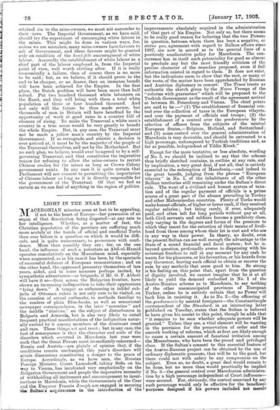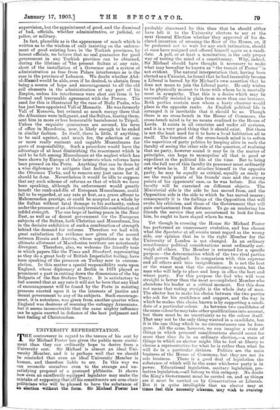LIGHT IN THE NEAR EAST.
Mif not to rithe heart of Europe—her possession of an ACEDONIAN miseries seem at last to be appealing, organ of that description being disputed—at any rate to her intelligence. Whether, as a matter of fact, the Christian population of the province are suffering much more acutely at the hands of official and unofficial Turks than ever before is a question on which it woul& be diffi- cult, and is quite unnecessary, to pronounce with confi- dence. More than possibly they are ; for, on the one baud, the influence of such a potentate as Abd-ul-Hamid operates cumulatively on the Mussulman mind, especially when augmented, as in his case it has been, by the spectacle of successful defiance of European remonstrance ; and on the other hand, the oppressed peasantry themselves of late - years, aided, and in some measure perhaps incited, by -sympathetic adventurers—or brigands, if Mr. G. F. Abbott will have it so—from across the Bulgarian frontier, have shown an increasing indisposition to take their oppressions "lying down." A temper so unbecoming in infidel sub- jects of Ottoman rulers is not only sure to be visited, on the occasion of actual outbreaks, in methods familiar to . the readers of plain Blue-books, as well as sensational newspaper correspondence, in the later " seventies " and the middle "nineties." on the subject of disturbances in Bulgaria and Armenia, but is also very likely to entail frequent practical manifestations of the indignation natur- ally excited by it among members of the dominant creed and race. These things act and react; but in any case, the fact of consequence is that the character and scale of the disorders which occurred in Macedonia last year were such that the Great Powers most immediately concerned— Russia and Austria—are plainly of opinion that, if the conditions remain unchanged, this year's disorders will attain dimensions constituting a danger to the peace of Europe. Accordingly, as we have seen, the Russian Foreign Minister, Count Lamsdorff, taking Sofia on his way to Vienna, has inculcated very emphatically on the Bulgarian Government and people the imperative necessity of withholding all incitement and encouragement to insur- rections in Macedonia, while the Governments of the Czar and the Emperor Francis Joseph are engaged in securing 4he Sultan's acquiescence in the introduction of the improvements absolutely required in the administration of that part of his Empire. Not only so, but there seems to be really good reason for believing that the two Powers in question, between whom there has been a negative, or status quo, agreement with regard to Balkan affairs since 1897, are now in accord as to the general lines of a positively ameliorative policy for Macedonia. The con- currence has in itself such potentiality for good as almost to preclude any but the most friendly criticism of the precise character of the remedies proposed, even if full information existed in regard to them. It does not exist, but the indications seem to show that the root, or many of the roots, of the matter have been apprehended by Russian and Austrian diplomacy in concert. The Times treats as authentic the sketch given by the Novoe Vremya of the "reforms with guarantees" which will be proposed to the Turkish Government as the result of the agreement arrived at between St. Petersburg and Vienna. The chief points are said to be :—" (1) The establishment of financial con- trol over the collection of taxes in the European vilayets, and over the payment of officials and troops ; (2) the establishment of a control over the gendarmerie by the • selection of officers from the subjects of the neutral European States,—Belgium, Holland, and Switzerland ; and (3) some control over the general administration of Macedonia is very desirable, and should be entrusted to a high personage, unhampered by Turkish traditions and, as far as possible, independent of Yildiz Kiosk."
Except for the more tentative, or less absolute, wording of No. 3, we should be inclined to say that the scheme thus briefly sketched contains, in outline at any rate, and by implication, a very great deal, if not all, that is entirely essential to the redemption of Macedonia,—and indeed to the great benefit, judging from the phrase "European vilayets " in No. 1, of the inhabitants of all the other Balkan territories still remaining under the Sultan's direct rule. The want of a civilised and honest system of taxa- tion and of the regular payment of officials is a prime source of a great part of the abuses prevailing in Turkey and other Mahommedan countries. Plenty of Turks would make honest officials, of higher or lower rank, if they received regular salaries ; but being rarely, if ever, adequately paid, and often left for long periods without pay at all, both Civil servants and soldiers become a predatory class, only varying in the degrees and forms of the pressure to which they resort for the extortion of their means of liveli- hood from those among whom their lot is cast and. who are in any way in their power. In theory, no doubt, even the present Sultan can see well enough the advantage to the State of a sound financial and fiscal system ; but he is, beyond question, profoundly averse to dispensing with his sovereign freedom to call at any moment for any cash he wants for his pleasures, or his favourites, or his hoards from any Governor, leaving such official to obtain or recover the sum by any methods that seem good to him. So strong is his feeling on this point that, apart from the question of dignity involved, we cannot imagine that he is at all likely to yield the demand embodied in No. 1 of the Austro-Russian scheme as to Macedonia, to say nothing of the other unemancipated provinces of European Turkey, unless he is entirely certain that no Power will back him in resisting it. As to No. 2—the officering of the gendarmerie by neutral foreigners—the Constantinople correspondent of the Standard, in an interesting letter published on Tuesday, states that the Sultan is believed to have given his assent to this point, though he adds that "it remains to be seen whether adequate powers will be granted." Unless they are, a vital element will be wanting in the provision for the preservation of order and the smooth working of reforms, which at first are likely enough to cause a certain amount of fanatical irritation among the Mussulmans, who have been the proud and privileged class. If the Sultan's consent to this essential feature of the Austro-Russian project can be obtained by the use of ordinary diplomatic pressure, that will be to the good, but there could not with safety be any compromise on the subject. Even so, no doubt, a great deal would remain to be done, but no more than would practically be implied if No. 3—the general control over Macedonian administra- tion by a high personage independent of Court influence— were secured. For, obviously, the control exercised by any such personage would only be effective for the beneficent purposes designed if his powers included not merely supervision, but the appointment of good, and the dismissal of bad, officials, whether administrative, or judicial, or police, or military.
In fact, plausible as is the appearance of much which is written as to the wisdom of only insisting on the enforce- ment of good existing laws in the Turkish provinces, by honest officials, we believe that no real guarantee for good government in any Turkish province can be obtained, during the lifetime of he present Sultan at any rate, short of the installation of a Governor and a system of administration as free from Palace interference as is the case in the province of Lebanon. We doubt whether Abd- ul-Hamid would be able, even if he desired, to abstain from being a source of hope and encouragement to all the old evil elements in the administration of any part of his Empire, unless his interference were shut out from it by formal and irrevocable agreement with the Powers. The need for this is illustrated by the case of Haft Pasha, who has just been appointed Vali of Monastir. He was formerly Vali of Kossovo, but evinced, so much energy there that the Albanians were indignant, and the Sultan, fearing them, sent him in more or less honourable banishment to Tripoli. Unless the requisite guarantees are secured, his term of office in Macedonia, now, is likely enough to be ended in similar fashion. In itself, there is little, if anything, to be said against, and much for, the selection of one or more really eminent and capable Mussulmans for posts of responsibility. Such a procedure would have the advantage of at least diminishing the resentment which is said to be felt among Mussulmans at the neglect which has been shown by Europe of their interests when reforms have been pressed on the Porte. Anything that can be done by a wise diplomacy to mitigate that feeling on the part of the Ottoman Turks, and to remove any just cause for it, should be done. Nevertheless it would be idle to suppose that any such scheme of reforms as that of which we have been speaking, although its enforcement would greatly benefit the rank-and-file of European Mussulmans, could fail to be regarded, at any rate at first, as a grave affront to idahommedan prestige, or could be accepted as a whole by the Sultan without fatal damage to his authority, unless under the pressure of an obviously irresistible combination of infidel strength. The one hope of lasting peace in the Near East, as well as of decent government for the European subjects of the Sultan, both Christian and Mussulman, lies in the decisive exhibition of such a combination of strength behind the demand for reforms. Therefore we hail with great satisfaction the evidence now given of the accord between Russia and Austria, whose aspirations as to the ultimate allotment of Macedonian territory are notoriously divergent. Therefore, also, we welcome the friendly tone in which papers like the Times and Standard, representing as they do a great body of British Imperialist feeling, have been speaking of the pressure on Turkey now in contem- plation. In this matter a special responsibility rests upon England, whose diplomacy at Berlin in 1878 played so prominent a part in cutting down the dimensions of the big Bulgaria of the San Stefano Treaty. It is satisfactory to feel assured that at any rate it will not be here that any kind Of encouragement will be found by the Porte in resisting pressure exerted upon it in the interests of justice and decent government to any of its subjects. Such encourage- ment, it is notorious, was given from another quarter when England was desirous of rescuing the unhappy Armenians, but it seems inconceivable that the same mighty influence can be again exerted in defiance of the best judgment and best feeling of Christendom.











































 Previous page
Previous page